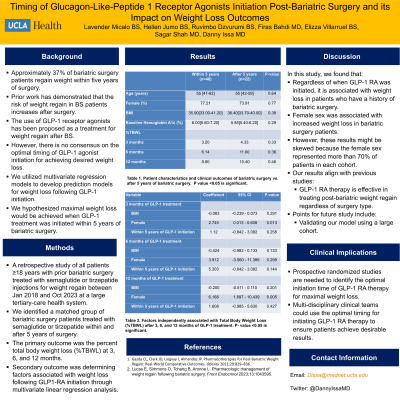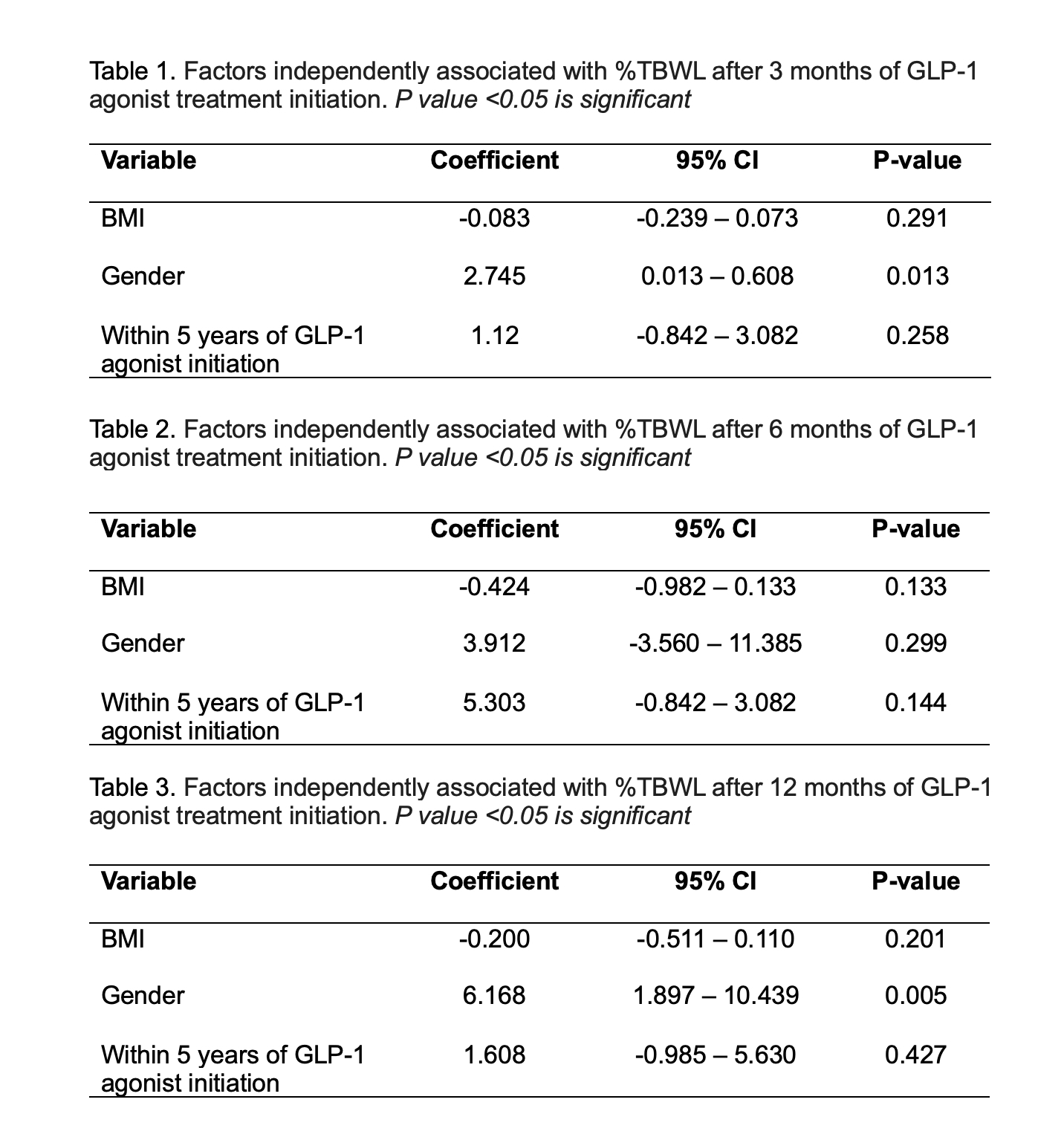Tuesday Poster Session
Category: Obesity
P4889 - Timing of Glucagon-Like Peptide 1 Receptor Agonists Initiation Post-Bariatric Surgery and its Impact on Weight Loss Outcomes
Tuesday, October 29, 2024
10:30 AM - 4:00 PM ET
Location: Exhibit Hall E

Has Audio

Lavender Micalo, BS
David Geffen School of Medicine at UCLA
Los Angeles, CA
Presenting Author(s)
Lavender Micalo, BS1, Hellen Jumo, BSc1, Ruvimbo Dzvurumi, BS1, Sagar Shah, MD1, Elizza E. Villarruel, BS2, Firas Bahdi, MD1, Danny Issa, MD1
1David Geffen School of Medicine at UCLA, Los Angeles, CA; 2David Geffen School of Medicine at UCLA, La Puente, CA
Introduction: Despite bariatric surgery being the most effective treatment for severe obesity, approximately 37% of patients regain weight within five years of surgery surgery (BS). Studies have shown that the risk of weight regain in BS patients significantly increases with time following surgery. Recent studies have evaluated the use of glucagon-like peptide-1 (GLP-1) agonists for the treatment of weight regain after BS. However, consensus on the optimal timing of GLP-1 agonist initiation has yet to be fully understood. We aimed to compare the efficacy of GLP-1 agonists when initiated within or beyond the five years following bariatric surgery.
Methods: We conducted a retrospective study using a prospectively maintained database of bariatric patients at a large tertiary-care referral center. Inclusion criteria were adult patients who underwent bariatric surgery and were prescribed GLP-1 agonists (semaglutide and tirzepatide) for weight regain between January 2018 and October 2023. Patients with missing weight measurements were excluded. Outcomes included change in percent total body weight loss (%TBWL) after 3, 6, and 12 months of GLP-1 agonists initiation. A multivariate regression model was used to evaluate the independent factors associated with %TBWL after 3, 6, and 12 months of treatment initiation.
Results: The study included a total of 68 patients with a history of bariatric surgery who had GLP-1 agonist treatments initiated within five years (n=46) and after five years (n=22) post-surgery. The groups had no significant differences in demographics, BMI, and baseline HgA1c. Multivariate linear regression analysis revealed no significant association between the time of initiation and %TBWL. However, the analysis showed that the female sex was associated with a 2.8% increase in TBWL after three months (p=0.013, CI: 0.608 - 4.88) and a 6.2% increase in TBWL after 12 months (p=0.005, CI: 1.89 - 10.44) of initiating GLP-1 agonist.
Discussion: Our study demonstrates that regardless of when GLP-1 treatment is initiated, it is associated with weight loss in patients who have undergone bariatric surgery. We also found that female sex was associated with increased weight loss in bariatric surgery patients. Our results highlight the need for further studies to elucidate the optimal timing of GLP-1 agonist therapy to prevent or remedy weight regain following bariatric surgery.

Note: The table for this abstract can be viewed in the ePoster Gallery section of the ACG 2024 ePoster Site or in The American Journal of Gastroenterology's abstract supplement issue, both of which will be available starting October 27, 2024.
Disclosures:
Lavender Micalo, BS1, Hellen Jumo, BSc1, Ruvimbo Dzvurumi, BS1, Sagar Shah, MD1, Elizza E. Villarruel, BS2, Firas Bahdi, MD1, Danny Issa, MD1. P4889 - Timing of Glucagon-Like Peptide 1 Receptor Agonists Initiation Post-Bariatric Surgery and its Impact on Weight Loss Outcomes, ACG 2024 Annual Scientific Meeting Abstracts. Philadelphia, PA: American College of Gastroenterology.
1David Geffen School of Medicine at UCLA, Los Angeles, CA; 2David Geffen School of Medicine at UCLA, La Puente, CA
Introduction: Despite bariatric surgery being the most effective treatment for severe obesity, approximately 37% of patients regain weight within five years of surgery surgery (BS). Studies have shown that the risk of weight regain in BS patients significantly increases with time following surgery. Recent studies have evaluated the use of glucagon-like peptide-1 (GLP-1) agonists for the treatment of weight regain after BS. However, consensus on the optimal timing of GLP-1 agonist initiation has yet to be fully understood. We aimed to compare the efficacy of GLP-1 agonists when initiated within or beyond the five years following bariatric surgery.
Methods: We conducted a retrospective study using a prospectively maintained database of bariatric patients at a large tertiary-care referral center. Inclusion criteria were adult patients who underwent bariatric surgery and were prescribed GLP-1 agonists (semaglutide and tirzepatide) for weight regain between January 2018 and October 2023. Patients with missing weight measurements were excluded. Outcomes included change in percent total body weight loss (%TBWL) after 3, 6, and 12 months of GLP-1 agonists initiation. A multivariate regression model was used to evaluate the independent factors associated with %TBWL after 3, 6, and 12 months of treatment initiation.
Results: The study included a total of 68 patients with a history of bariatric surgery who had GLP-1 agonist treatments initiated within five years (n=46) and after five years (n=22) post-surgery. The groups had no significant differences in demographics, BMI, and baseline HgA1c. Multivariate linear regression analysis revealed no significant association between the time of initiation and %TBWL. However, the analysis showed that the female sex was associated with a 2.8% increase in TBWL after three months (p=0.013, CI: 0.608 - 4.88) and a 6.2% increase in TBWL after 12 months (p=0.005, CI: 1.89 - 10.44) of initiating GLP-1 agonist.
Discussion: Our study demonstrates that regardless of when GLP-1 treatment is initiated, it is associated with weight loss in patients who have undergone bariatric surgery. We also found that female sex was associated with increased weight loss in bariatric surgery patients. Our results highlight the need for further studies to elucidate the optimal timing of GLP-1 agonist therapy to prevent or remedy weight regain following bariatric surgery.

Figure: Results of Multivariate Linear Regression Analysis.
Note: The table for this abstract can be viewed in the ePoster Gallery section of the ACG 2024 ePoster Site or in The American Journal of Gastroenterology's abstract supplement issue, both of which will be available starting October 27, 2024.
Disclosures:
Lavender Micalo indicated no relevant financial relationships.
Hellen Jumo indicated no relevant financial relationships.
Ruvimbo Dzvurumi indicated no relevant financial relationships.
Sagar Shah indicated no relevant financial relationships.
Elizza Villarruel indicated no relevant financial relationships.
Firas Bahdi indicated no relevant financial relationships.
Danny Issa: Boston Scientific – Consultant, Speakers Bureau. Eli Lilly – Speakers Bureau.
Lavender Micalo, BS1, Hellen Jumo, BSc1, Ruvimbo Dzvurumi, BS1, Sagar Shah, MD1, Elizza E. Villarruel, BS2, Firas Bahdi, MD1, Danny Issa, MD1. P4889 - Timing of Glucagon-Like Peptide 1 Receptor Agonists Initiation Post-Bariatric Surgery and its Impact on Weight Loss Outcomes, ACG 2024 Annual Scientific Meeting Abstracts. Philadelphia, PA: American College of Gastroenterology.
